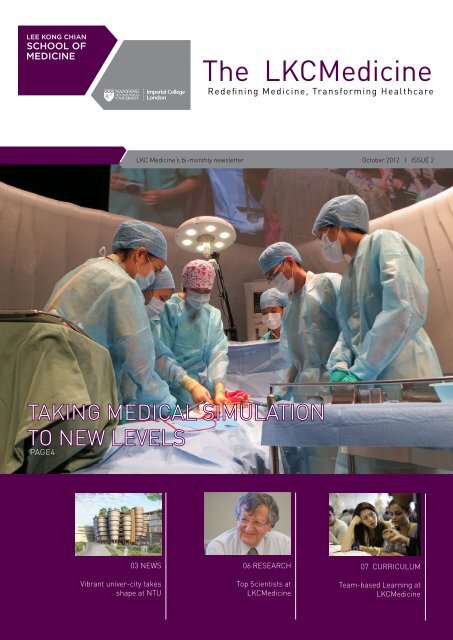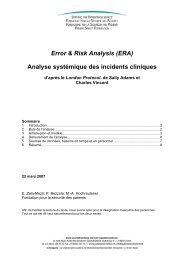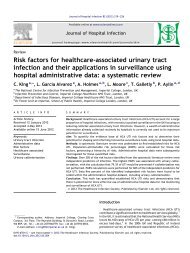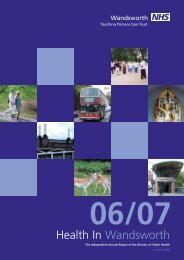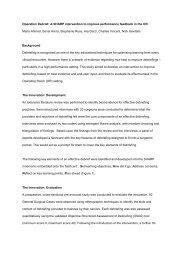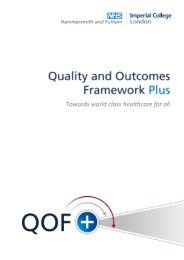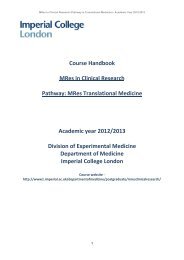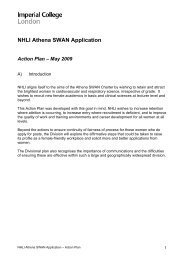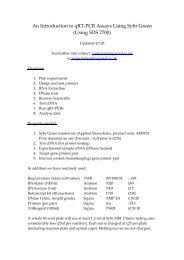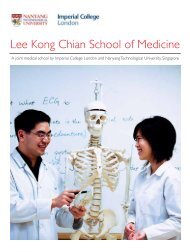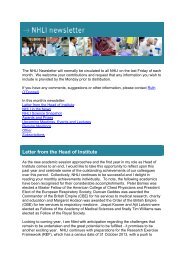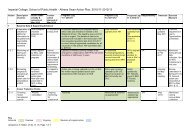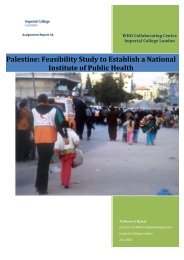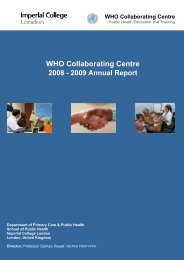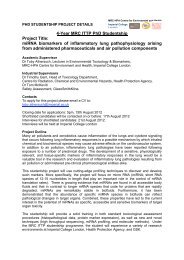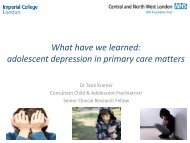The LKCMedicine - Imperial College London
The LKCMedicine - Imperial College London
The LKCMedicine - Imperial College London
You also want an ePaper? Increase the reach of your titles
YUMPU automatically turns print PDFs into web optimized ePapers that Google loves.
<strong>The</strong> <strong>LKCMedicine</strong><br />
LKC Medicine’s bi-monthly newsletter October 2012 | ISSUE 2<br />
TAKING MEDICAL SIMULATION<br />
TO NEW LEVELS<br />
PAGE4<br />
03 NEWS<br />
Vibrant univer-city takes<br />
shape at NTU<br />
06 RESEARCH<br />
Top Scientists at<br />
<strong>LKCMedicine</strong><br />
07 CURRICULUM<br />
Team-based Learning at<br />
<strong>LKCMedicine</strong>
Page 2 | IN FOCUS LKC MEDICINE ISSUE 2 | OCTOBER 2012<br />
Message from our Staff<br />
<strong>The</strong> Lee Kong Chian School of Medicine,<br />
a partnership between NTU and <strong>Imperial</strong><br />
<strong>College</strong> <strong>London</strong>, will train a generation of<br />
doctors who will put patients at the centre of<br />
their exemplary medical care. Graduates of<br />
the five-year undergraduate medical degree<br />
programme beginning in 2013 will have a<br />
strong understanding of the scientific basis<br />
of medicine, along with interdisciplinary<br />
subjects including business management and<br />
technology.<br />
<strong>The</strong> school’s primary clinical partner is the<br />
National Healthcare Group, a leader in public<br />
healthcare recognised for the quality of its<br />
medical expertise, facilities and teaching.<br />
<strong>The</strong> school, named after local philanthropist<br />
Dato Sri Lee Kong Chian, aims to be a future<br />
model for innovative medical education. Its<br />
first doctors will graduate in 2018 with a<br />
Bachelor of Medicine and Bachelor of Surgery<br />
(MBBS), awarded jointly by NTU and <strong>Imperial</strong><br />
<strong>College</strong> <strong>London</strong>, and become doctors who<br />
will enhance Singapore’s healthcare in the<br />
decades to come.<br />
EDITOR’S CORNER<br />
For this second edition of the<br />
<strong>LKCMedicine</strong> newsletter, we’ve gone<br />
paperless in the spirit of going green,<br />
and as part of NTU’s bigger focus<br />
on nurturing a Sustainable Earth. At<br />
another level, the School shares this<br />
ambition by aiming to build a sustainable<br />
future campus at NTU’s Yunnan Garden<br />
site and in Novena. If one were to drop<br />
by 11 Mandalay Road, the speed at which<br />
the School’s new headquarters is being<br />
readied may surprise. This, while the<br />
<strong>LKCMedicine</strong> space in NTU’s Research<br />
Techno Plaza is undergoing expansion.<br />
Alongside this ramped-up construction<br />
of its facilities, the rest of the School<br />
is shaping up nicely, thanks to the<br />
expertise provided by its parent<br />
universities. <strong>The</strong>se past two months,<br />
our admissions processes are being<br />
fine-tuned, research labs are being<br />
kitted out, renowned scientists invited<br />
over to jump start strategic research<br />
programmes at the School and<br />
our curriculum teams are working<br />
feverishly to firm up teaching material<br />
and our collaborative learning matrix.<br />
Meanwhile, our Assistant Deans are<br />
looking into how we can take simulation<br />
in medical education to new levels and<br />
stress the importance of integrated care<br />
in the <strong>LKCMedicine</strong> programme. All<br />
these are featured in this edition of the<br />
newsletter. I hope you enjoy the read.<br />
Siti Rohanah Koid<br />
Professor Martyn Partridge<br />
Senior Vice Dean, <strong>LKCMedicine</strong><br />
A truly successful medical school<br />
requires three important components.<br />
Quality medical education is vital if we are<br />
to produce professional and competent<br />
doctors equipped for today’s healthcare<br />
challenges, and who acknowledge<br />
patients’ growing expectations and desire<br />
for shared decision making. High quality<br />
medical education needs to be equally<br />
respected alongside high quality scientific<br />
research, and top rate academics<br />
understand their role in inspiring and<br />
developing future colleagues. However,<br />
neither good teaching nor good<br />
translational research can be undertaken<br />
unless the third component is in place,<br />
namely extremely good relationships with<br />
our major clinical partners.<br />
<strong>The</strong>se three components are receiving<br />
equal attention from the whole team at<br />
<strong>LKCMedicine</strong>, for all are interlinked. <strong>The</strong><br />
learning outcomes and content for Years<br />
1 and 2 of the school’s new programme<br />
are now almost complete and they will be<br />
used within a course heavily dependent<br />
upon collaborative learning. Experts in<br />
Team Based Learning have visited and<br />
others are being appointed and a faculty<br />
development programme undertaken,<br />
but our ethos is for our scientists and<br />
clinicians to partake of these learning<br />
sessions as experts in their field and not<br />
IN BRIEF<br />
Postdoctoral Fellowship launch<br />
<strong>The</strong> <strong>LKCMedicine</strong> Postdoctoral Fellowship<br />
will be launched this year, to nurture a cadre<br />
of talented biomedical and clinical research<br />
scientists. One Fellowship will be awarded a<br />
year. <strong>The</strong> School has identified five research<br />
themes it expects to achieve excellence in:<br />
neuroscience and mental health, metabolic<br />
disease, infectious disease, bioengineering<br />
including structural biology, and health<br />
services outcome research.<br />
<strong>LKCMedicine</strong> in Shanghai<br />
An <strong>LKCMedicine</strong> team was in Shanghai<br />
end August to present at the Singapore<br />
Consulate-General Open House 2012, upon<br />
the invitation of Contact Singapore. <strong>The</strong> team<br />
also met with Singaporean students at the<br />
Shanghai Singapore International School,<br />
Yew Chung International School and Suzhou<br />
Singapore International School. <strong>The</strong> team<br />
also visited Fudan University, at the invitation<br />
of its School of Pharmacy Dean.<br />
to have to be concerned by the logistics of<br />
the learning method.<br />
In parallel with the effort that is going into<br />
collaborative learning is an equal effort<br />
to ascertain how we can take simulation<br />
in medical education to new levels. We<br />
believe that this process involves far<br />
more than a communications course<br />
involving actors. At <strong>LKCMedicine</strong> this will<br />
involve use of simulation, including hybrid<br />
simulation, throughout all five years of<br />
the course looking at the whole aspect<br />
of doctoring, from communication to<br />
practical competency to appreciation of<br />
different ways of delivering healthcare.<br />
Our students have to clearly understand<br />
the importance of integrated care, namely<br />
care delivered by the most appropriate<br />
healthcare professional at the most<br />
appropriate time in the optimal setting.<br />
Inevitably with such a large venture as<br />
starting a new medical school we will be<br />
pushing the envelope, but the innovation<br />
which we are instituting has always been<br />
tested somewhere else, and very often at<br />
<strong>Imperial</strong>. Over the next nine months we<br />
have in place a robust system for testing<br />
all parts of our new curriculum and its<br />
delivery. We are confident that Singapore<br />
will have a new medical school producing<br />
doctors for Singapore of the type that you<br />
and I would wish to have caring for us.<br />
Partnering Institute for Media Innovation<br />
<strong>LKCMedicine</strong> is partnering NTU’s Institute<br />
for Media Innovation to produce software<br />
for the iPad that will provide 3-D models<br />
of the human body. <strong>The</strong> project will see the<br />
recruitment of local patients and the plan is<br />
to create a central database of 3-D models<br />
of real-life patients. <strong>The</strong> project for a start<br />
will focus on reproducing 3-D models of the<br />
lower limbs.<br />
SMARTMesh for hernia repair<br />
A new technology invented by NTU Provost<br />
Professor Freddy Boey has been used by<br />
Singaporean start-up Medlinx Acacia to<br />
create SMARTMesh, a hernia mesh made<br />
of a polymer-based material that promises<br />
to help patients heal better and faster with<br />
fewer side effects, while being easier on the<br />
pocket. Medlinx Acacia said the product was<br />
made possible by working with NTU’s School<br />
of Materials Science and Engineering.
ISSUE 2 | OCTOBERT 2012<br />
LKC MEDICINE<br />
NEWS|<br />
Page 3<br />
Vibrant univer-city takes shape at NTU<br />
campus to be able to do so. In addition,<br />
a new graduate hall will be ready by<br />
December this year, more than doubling<br />
the current 480 places to 1,170 places.<br />
Also in the pipeline is a new Academic<br />
Building near NTU’s School of Material<br />
Science and Engineering, and the<br />
School of Mechanical and Aerospace<br />
Engineering. About 2.5 times the size of<br />
a football field, the building will enhance<br />
both schools’ laboratory facilities<br />
and provide more room for multidisciplinary<br />
collaboration by teams of<br />
students, faculty, visiting professors and<br />
researchers..<br />
<strong>LKCMedicine</strong> students can look forward to<br />
a transformed NTU campus, when a new<br />
univer-city with varied spaces for education,<br />
research, social and leisure activities takes<br />
shape in the next few years. .<br />
Under Phase 1 of the University’s Campus<br />
Master Plan unveiled at a groundbeaking<br />
ceremony by Minister for Education Heng<br />
Swee Keat on October 12th, two learning<br />
hubs, eight residential halls, a new graduate<br />
hall, and two academic buildings will be<br />
added to the campus. <strong>The</strong>se are expected<br />
to be completed by 2016 and will cost S$700<br />
million.<br />
NTU President Professor Bertil Andersson<br />
said, “Our ambition is to build a modern<br />
campus that is at the leading edge of<br />
science and technology. Hardware and<br />
facilities are vital to generate and testbed<br />
innovative ideas, as well as to spur<br />
collaboration among our faculty, students,<br />
industry and global partners. Once our<br />
new state-of-the-art buildings and<br />
facilities are up and running, they will<br />
deepen and widen the research and<br />
development capacity in NTU, and<br />
further promote collaboration both<br />
within and across disciplines.”<br />
Among the exciting developments is<br />
the building of the first Learning Hub,<br />
a seven-storey centre housing 55 newgeneration<br />
classrooms of the future,<br />
designed to support new pedagogies<br />
by promoting more interactive small<br />
group teaching and active learning. It is<br />
envisaged as a 24-hour centre equipped<br />
with a cafeteria, library and even a roof<br />
top garden.<br />
On-campus living will be boosted<br />
with the building of additional halls<br />
of residence for students - 1,250<br />
more spaces by July 2014, and 5,000<br />
more by 2015. This will allow every<br />
undergraduate who desires to stay on<br />
This new building will complement<br />
<strong>LKCMedicine</strong>’s upcoming Experimental<br />
Medicine Building. To be completed in<br />
2015, this building will be located within<br />
NTU’s biomedical engineering cluster<br />
and linked to the School of Biological<br />
Sciences.<br />
Generous Scholarships and Bursaries for<br />
<strong>LKCMedicine</strong> Students<br />
Without doubt, medical schools attract<br />
applications from the best and the brightest.<br />
At <strong>LKCMedicine</strong>, we maintain a strict<br />
merit-based admissions policy and are<br />
committed to ensuring that all students who<br />
are admitted will not be denied an education<br />
at the School due to financial hardship.<br />
Thanks to our donors and NTU, generous<br />
scholarships and bursaries will be available<br />
for our students.<br />
In this edition, we are pleased to announce<br />
that outstanding students aiming to pursue<br />
their undergraduate MBBS programme at<br />
<strong>LKCMedicine</strong> may apply for the Nanyang<br />
Scholarship as well as the <strong>LKCMedicine</strong><br />
Scholarship, each tenable for five years.<br />
<strong>The</strong> most prestigious undergraduate<br />
scholarship at NTU, the Nanyang<br />
Scholarship will fund annual tuition fees<br />
in full, annual living, accommodation<br />
and book allowances, and one-off<br />
computer and travel grants. In addition,<br />
the Nanyang Scholar will enjoy<br />
priority for NTU’s Global Immersion<br />
Programme.<br />
<strong>The</strong> all-new <strong>LKCMedicine</strong> Scholarship<br />
will fund annual tuition fees in full<br />
as well as annual living and book<br />
allowances, and a one-off computer<br />
grant.<br />
For students experiencing financial<br />
hardship, <strong>LKCMedicine</strong> offers a generous<br />
number of bursaries, thanks to the kind<br />
donations of Lee Foundation and the E I<br />
Parrish Trust.<br />
<strong>The</strong> Lee Kong Chian Bursary and the E<br />
I Parrish Bursary – established by the<br />
Lee Foundation and the E I Parrish Trust<br />
respectively – will fund up to 80 per cent<br />
of annual tuition fees and an annual living<br />
allowance. In exceptional cases, the E I<br />
Parrish Trust will fund 100 per cent of<br />
annual tuition fees and an annual living<br />
allowance.<br />
For more information, please visit our<br />
website: www.lkcmedicine.ntu.edu.sg
Page 4 | IN FOCUS LKC MEDICINE ISSUE 2 | OCTOBER 2012<br />
TAKING MEDICAL SIMULATION<br />
TO NEW LEVELS By Dr Tanya Tierney<br />
We keep them one<br />
step ahead of what<br />
they will be expected<br />
to do with real<br />
patients.<br />
Imagine you are in an A380 on<br />
Singapore Airlines, about to take off. You<br />
are putting your life in the hands of the<br />
pilot trusting that he or she has been<br />
trained to deal with any emergency that<br />
might arise. That pilot will have been<br />
trained using simulation – everything<br />
from the basic routine take-off to<br />
emergency landings in severe weather<br />
conditions or engine failure. This<br />
ensures that the pilots are prepared<br />
for the real thing at every stage of their<br />
training.<br />
How does this apply to <strong>LKCMedicine</strong><br />
At <strong>LKCMedicine</strong>, we are also using<br />
this approach to simulation – we will<br />
ensure our students feel prepared at<br />
every stage of their medical training<br />
by carefully planned simulation that is<br />
aligned with the rest of the curriculum.<br />
Simulation is not a replacement for real<br />
clinical exposure, but an adjunct which<br />
will help them feel confident and be<br />
competent before they work with real<br />
patients in a real clinical setting.<br />
How do we align simulation with the<br />
curriculum<br />
It is natural for new medical students to<br />
feel nervous about talking with patients.<br />
In our introductory course, students will<br />
spend one week in a polyclinic and one<br />
week in a hospital setting. Prior to this<br />
they will work with simulated patients<br />
(SPs - role-players hired to play the part<br />
of a patient in a realistic way) to practise<br />
simply approaching the patient and asking<br />
if they can talk to them for 5 minutes<br />
about why they have come to the polyclinic<br />
or hospital today. <strong>The</strong>y can practise<br />
essential basic skills like introducing<br />
themselves, active listening as the<br />
patient tells their story and dealing with<br />
situations that might arise - for example<br />
a patient who might be worried about<br />
missing their appointment or one that<br />
doesn’t want to speak with a student. SPs<br />
will give feedback to the students to help<br />
them develop their communication skills.<br />
As the students progress through their<br />
course, their interactions with SPs<br />
become more challenging. We lead<br />
the students through more and more<br />
complex skills – history taking, explaining<br />
diagnoses to patients, explaining risks of<br />
procedures, breaking bad news, dealing<br />
with patients who are upset, or angry,<br />
dealing with ethical dilemmas and more.<br />
We keep them one step ahead of what<br />
they will be expected to do with real<br />
patients.<br />
<strong>LKCMedicine</strong> is recruiting Simulated Patients such as these.
ISSUE 2 | OCTOBERT 2012<br />
LKC MEDICINE<br />
IN FOCUS | Page 5<br />
Simulation is not a replacement for real clinical<br />
exposure, but an adjunct which will help them feel<br />
confident and be competent before they work with<br />
real patients in a real clinical setting.<br />
Where do we get the Simulated Patients<br />
from<br />
SPs are recruited from the general public<br />
but usually will have a background in<br />
acting as they need to be realistic in<br />
their portrayal of the patient. We provide<br />
training for them in role-play and also<br />
in how to give feedback to students to<br />
support their learning. We have started<br />
recruiting SPs and will be building up our<br />
pool of SPs and running training for them<br />
over the next few months.<br />
What other sorts of simulation are we<br />
using<br />
<strong>The</strong> practical skills will be taught with<br />
“part task trainers” or models of body<br />
parts specially designed for students to<br />
practise on. For example, students can<br />
practise suturing on a pad made of skinlike<br />
material or can practise venepuncture<br />
on an arm designed for just that. Once<br />
students have learned the technique they<br />
can practise in “hybrid simulation” where<br />
we align the part task trainer with an SP<br />
– this means that the students need to<br />
consider how they interact with the patient<br />
whilst performing the technical skills.<br />
What about more complex simulations<br />
<strong>The</strong> possibilities are limitless. For<br />
example, last June, in collaboration with a<br />
team lead by Professor Roger Kneebone,<br />
<strong>Imperial</strong> <strong>College</strong>’s Professor of Surgical<br />
Education and <strong>LKCMedicine</strong>’s Visiting<br />
Professor, we have delivered complex<br />
surgical simulation involving a full<br />
surgical team, student paramedics and<br />
audience participation in a theatre setting<br />
for an audience of 600. <strong>The</strong>se kinds of<br />
complex simulations can be designed to<br />
incorporate complex techniques, team<br />
interactions and potential challenges –<br />
always keeping in mind what is required<br />
of the students at that stage so we keep<br />
our simulations aligned with the rest of<br />
their curriculum. As students progress<br />
through the curriculum, we will design<br />
more complex scenarios for them to take<br />
part in.<br />
What about mannequin simulation<br />
For some scenarios, the best “patient”<br />
is a whole body mannequin. Full body<br />
mannequins are highly sophisticated<br />
models that can be controlled wirelessly.<br />
<strong>The</strong>y breathe, bleed, blink, even<br />
shiver and sweat. <strong>The</strong>y have realistic<br />
breathing and circulatory functions and<br />
can simulate many cardiorespiratory<br />
problems including cardiac arrest<br />
and difficult airways and are used for<br />
resuscitation training.<br />
Where will all this take place<br />
In the upcoming Clinical Sciences<br />
Building at our campus in Novena,<br />
we will have state-of-the-art Clinical<br />
and Communication Skills Centre<br />
(CCS). Here, students will practise<br />
consultations with SPs in realistic<br />
consulting rooms and keep digital<br />
recordings of their consultations in the<br />
e-portfolio. <strong>The</strong>y will learn practical<br />
skills in the clinical skills lab and<br />
then move on to hybrid simulation in<br />
the simulated ward setting. Students<br />
will also be trained at the brand new<br />
simulation centre (SIMTAC) at Tan Tock<br />
Seng Hospital, which will be extremely<br />
Benefits of Simulation<br />
useful while the Clinical Sciences<br />
Building is being constructed. <strong>The</strong><br />
building will be ready by 2015.<br />
In Conclusion<br />
Our simulation programme aims to<br />
provide students a safe environment<br />
in which to practice new skills and<br />
techniques. Aligning simulation<br />
alongside the curriculum will ensure<br />
that students are fully prepared to get<br />
the best out of their clinical placements,<br />
making the best use of the time given<br />
by their clinical teachers and real<br />
patients they see on attachments. Like<br />
the passengers on the A380, patients<br />
meeting <strong>LKCMedicine</strong> students can feel<br />
safe in the knowledge that the student<br />
is fully prepared to carry out the task<br />
they are now being asked to consent to,<br />
whether it be a simple history taking,<br />
or something more practical like taking<br />
blood or suturing a laceration.<br />
• Provide a safe setting for students to practise their skills<br />
• Reduce the burden on clinical teachers and the patients in their care<br />
• Ensure all students are exposed to essential scenarios<br />
• Allow students to experience rare cases that they may not see otherwise<br />
• Allow students to receive feedback from SPs, peers and tutors<br />
• Allow students to keep recordings of their SP encounters<br />
• Allows standardisation of assessments (e.g. Simulation in OSCE exams)
Page 6 | RESEARCH & CURRICULUM<br />
<strong>LKCMedicine</strong> has appointed an eminent<br />
group of Visiting Professors to jump<br />
start strategic research programmes at<br />
the school and the university in areas<br />
of metabolism, radiochemistry and<br />
simulation technologies. <strong>The</strong> School<br />
welcomes Professor Walter Wahli,<br />
Professor Christer Halldin, Professor<br />
Balazs Gulyas, Professor Roger<br />
Kneebone and Dr Fernando Bello.<br />
Professor Wahli is Professor of Biology<br />
and Founding Director of the Centre<br />
of Integrative Genomics, University of<br />
Lausanne. He is one of the pioneers<br />
who discovered the medically relevant<br />
Peroxisome Proliferator-Activated<br />
Receptors and has demonstrated<br />
the central physiological significance<br />
of these regulatory proteins in<br />
metabolism, inflammation and wound<br />
healing. Professor Wahli will develop<br />
a strategic programme focusing on<br />
research questions that will constitute<br />
part of a broader Singaporean initiative<br />
that concentrates on late pregnancy and<br />
early postnatal life, with aims to identify<br />
molecular mechanisms and molecules,<br />
emanating from the interplay between<br />
nutrients and microbiota in relation<br />
to obesity and associated metabolic<br />
diseases.<br />
Professor Halldin is Professor of<br />
Medicinal Radiochemistry and Director<br />
Top Names Appointed for Research<br />
By Dr Andrew Ang and Dr Ng Sean Pin<br />
of the Positron Emission Tomography<br />
(PET) Centre, Karolinska Institutet. He<br />
is a scientific leader with an established<br />
reputation in running the internationally<br />
competitive translational neuroimaging<br />
PET centre at Karolinska that spans<br />
from small animals to humans, focusing<br />
primarily the development of new tracers<br />
for neuroimaging. Today, more than 1/3<br />
of the radioligands used for clinical brain<br />
PET imaging throughout the world had<br />
been developed by this group. Professor<br />
Gulyas is Professor of Neuroscience at<br />
Karolinska Institutet and an expert in PET<br />
neuroimaging. Together with Professor<br />
Gulyas, Professor Halldin will develop<br />
a strategic programme in translational<br />
neuroimaging in collaboration with the<br />
National Neuroscience Institute, Institute<br />
of Mental Health and the Clinical Imaging<br />
Research Centre, NUS.<br />
Professor Kneebone is the Professor<br />
of Surgical Education, <strong>Imperial</strong> <strong>College</strong><br />
<strong>London</strong>. He is a world renowned expert<br />
Team-based Learning at <strong>LKCMedicine</strong><br />
By Dr Preman Rajalingam<br />
Medicine has progressed greatly during<br />
the last three decades and by some<br />
estimates, the amount of medical<br />
knowledge that a doctor has to deal<br />
with doubles every five to seven years.<br />
However faculty–student contact hours<br />
cannot be expanded in parallel, unless<br />
the time taken to complete a medical<br />
degree also becomes longer and longer.<br />
Textbooks, video recorded lectures,<br />
electronic resources, and web-based<br />
units of study make possible independent<br />
learning outside class, but how does one<br />
ensure that future doctors have really<br />
understood and can apply what they have<br />
learnt<br />
To address this challenge, <strong>LKCMedicine</strong><br />
has decided to engage students in a<br />
form of active learning called Team-<br />
Based Learning (TBL). TBL incorporates<br />
multiple small groups of 5–7 students<br />
within a single classroom and has been<br />
Professor Walter Wahli<br />
used effectively with both large (>100<br />
students) and smaller classes (
ISSUE 2 | OCTOBER 2012<br />
LKC MEDICINE<br />
RESEARCH & CURRICULUM | Page 7<br />
Marrying Science and Medicine<br />
By Professor Michael A. Ferenczi<br />
How much Science should doctors<br />
know This question is pertinent to<br />
those setting out the curriculum for<br />
our students in the <strong>LKCMedicine</strong> at<br />
NTU. Some might argue that in dayto-day<br />
life, doctors need little science<br />
background as what makes a good<br />
doctor are her/his communications<br />
skills, bedside manner, clinical skills<br />
and experience.<br />
So where is the Science I would<br />
argue that understanding of the body’s<br />
processes in health and disease,<br />
down to the functioning of molecules<br />
such as DNA and proteins is key for<br />
the formation of our Doctors. <strong>The</strong><br />
human body is a complicated place,<br />
with interactions between all systems<br />
at all levels, from molecules to the<br />
brain, not forgetting the role of the<br />
environment through diet, exercise,<br />
stress and affective interactions. It<br />
is perhaps the French physiologist<br />
Claude Bernard who first realised in<br />
the 19th century how interconnected<br />
the organs of our bodies are, and how<br />
the cells and tissues communicate and<br />
interact to maintain a steady internal<br />
environment, the milieu intérieur’ of<br />
the living organism, a process which he<br />
called ‘homeostasis’. Much of medical<br />
science since has been concerned with<br />
understanding homeostasis. How is our<br />
temperature kept constant whatever<br />
the weather How is our blood pH<br />
remaining within narrow limits however<br />
much orange juice we drink How is our<br />
blood sugar kept constant, whether we fast<br />
or feast Understanding these processes<br />
allows us to recognise disease. Greater<br />
understanding allows us to use drugs wisely<br />
or to discover the cause of disease.<br />
Future improvements in our health will be<br />
based, as it has been in the past, on new<br />
information, new measurements, technical<br />
breakthroughs and greater understanding.<br />
Our doctors of tomorrow will not know<br />
everything there is to know, but will have<br />
a solid grounding in biomedical sciences<br />
and, perhaps more importantly, will know<br />
where to find the relevant information, how<br />
to understand and apply new information by<br />
interacting within their teams and beyond,<br />
and will know how to stay at the forefront<br />
of their profession throughout their career.<br />
In <strong>LKCMedicine</strong>, I shall strive to make sure<br />
that our students will be equipped with<br />
the basic knowledge, and the tools, that<br />
they will need to grow into the very best<br />
of doctors, whether in primary care, in<br />
sophisticated hospitals or making groundbreaking<br />
advances in experimental medical<br />
science.<br />
What about Research<br />
How important is research in a medical<br />
school Surely Medicine is a trade that<br />
requires skills, but research is irrelevant<br />
to the vast majority of doctors and to their<br />
everyday practice. As a scientist, I see<br />
that scientific research is relevant for the<br />
advancement of Medicine, for improving<br />
treatment of old diseases, for discovering<br />
cures to new diseases and for ameliorating<br />
the suffering of those with long-term<br />
illnesses or for whom advancing age<br />
brings new challenges. And for the patient,<br />
Medical Students Assist in Shaping<br />
<strong>LKCMedicine</strong> Curriculum<br />
By Dr Naomi Low-Beer<br />
bombarded with daily news stories about<br />
new treatment for this or new cure for<br />
that, is she or he not entitled to get from<br />
his doctor the most up-to-date and most<br />
effective treatment How can the doctor<br />
understand new developments and<br />
improvements in medical care without<br />
being familiar with medical research,<br />
with its mind-boggling new technologies,<br />
the ever-expanding jargon of molecules,<br />
genes, mutations, drugs and signals<br />
<strong>The</strong> answer to these questions is found<br />
in Medical Education built on a strong<br />
grounding in the Scientific Method, in<br />
Evidence-based Medicine and in training<br />
in Research Methodologies. This is why<br />
<strong>LKCMedicine</strong> is building state-of-the-art<br />
research facilities and a strong core of<br />
Basic Sciences and Clinical Sciences.<br />
New buildings are being erected to house<br />
Experimental Medicine and Clinical<br />
Sciences – to ensure that our doctors’<br />
teachers will be involved in the scientific<br />
developments of the future, and will<br />
search and innovate. <strong>The</strong>ir students,<br />
our future doctors, will be inspired by<br />
the research, and will contribute and<br />
participate in its progress. <strong>The</strong>se future<br />
doctors will understand the limitations of<br />
their knowledge, and then will go beyond<br />
it, by continuing to learn, and to discover.<br />
With the English summer well and<br />
truly over, we have said goodbye<br />
to our medical students who gave<br />
up much of their holiday to work<br />
on the curriculum - drafting MCQs<br />
for team-based learning (TBL) and<br />
undertaking a comprehensive review<br />
of the <strong>LKCMedicine</strong> curriculum. Our<br />
special thanks to Claire Vassie (year<br />
4) and Brendan Thoms (year 3), key<br />
members of our Curriculum Review<br />
Team. <strong>The</strong>y did a superb job analysing<br />
materials, checking for consistency<br />
and sequencing, and for alignment<br />
with learning outcomes. This has provided<br />
extremely useful student feedback for<br />
course leads in <strong>London</strong>.<br />
Colleagues in Singapore have given<br />
tremendous support – their feedback has<br />
been invaluable and some have developed<br />
new learning content. We are particularly<br />
grateful to Heng Bee Hoon (Public<br />
Health & Epidemiology) and Chu Sze Hon<br />
(Dermatology) for their work, which has<br />
been of the highest quality.<br />
Our focus is now on the educational<br />
materials to support TBL. Recordings of<br />
narrated PowerPoints are underway<br />
and videoed lectures and eModules<br />
will follow, all accessible by iPad.<br />
Collaborative working is more important<br />
and productive than ever – our<br />
videoconference facility is increasingly<br />
used to discuss a range of curriculum<br />
issues, including timetabling, exams,<br />
TBL applications and ePortfolio.<br />
Many thanks to all those involved for<br />
their hard work and commitment –<br />
excellent progress is being made.
Page 8 | PROFILE LKC MEDICINE ISSUE 2 | OCTOBER 2012<br />
United in Philanthropy<br />
By Suzanne Lim<br />
In 1844, philanthropist Tan Tock Seng’s<br />
(1798 – 1850) gift made it possible to<br />
build the Chinese Paupers’ Hospital at<br />
Pearl’s Hill, Singapore’s first privately<br />
funded hospital. Renamed Tan Tock<br />
Seng Hospital (TTSH) after Tan’s death,<br />
it moved to its current location in Novena<br />
in 1903.<br />
TTSH has since grown from strength to<br />
strength and is consistently voted Top<br />
Teaching Hospital by medical students.<br />
As <strong>LKCMedicine</strong>’s primary clinical partner,<br />
TTSH will provide vital training support for<br />
our students. In addition, <strong>LKCMedicine</strong>’s<br />
administrative headquarters will be housed<br />
in TTSH’s former nurses’ hostel at block<br />
107, Mandalay which has been gazetted as a<br />
heritage building.<br />
Tan Sri Dato Lee Kong Chian (1893 – 1967) is<br />
synonymous with philanthropy in Singapore,<br />
having founded the Lee Foundation in 1952.<br />
<strong>The</strong> Foundation has continued with its<br />
founder’s legacy of giving to education, most<br />
notably with its landmark $150 million gift to<br />
<strong>LKCMedicine</strong> in 2011.<br />
Singaporeans are also forever indebted<br />
as it was the Lee Foundation’s gift<br />
of $375,000 to build the National<br />
Library at Stamford Road in 1960 that<br />
spearheaded free public library services<br />
for the nation.<br />
With <strong>LKCMedicine</strong> joining TTSH in<br />
Novena come August 2013, two of<br />
Singapore’s most illustrious names in<br />
philanthropy are now united to herald<br />
in a new era for medical education and<br />
healthcare in Singapore.<br />
To explore giving to <strong>LKCMedicine</strong>,<br />
please contact Suzanne Lim at suzanne.<br />
lim@ntu.edu.sg or +65 6592 1784.<br />
FROM THE LONDON OFFICE<br />
Visit by <strong>LKCMedicine</strong><br />
By Paul Ratcliffe<br />
On October 1st, <strong>Imperial</strong> <strong>College</strong> <strong>London</strong>’s<br />
Faculty of Medicine (FoM) welcomed its<br />
new Principal, Professor Dermot Kelleher<br />
who concurrently holds the position<br />
of Dean of the Lee Kong Chian School<br />
of Medicine, a joint medical school by<br />
<strong>Imperial</strong> and NTU.<br />
In his first message to the FoM, Professor<br />
Kelleher wrote about the warm welcome<br />
he had received, adding that it is a<br />
pleasure and privilege to be appointed the<br />
new head of the Faculty. In particular he<br />
thanked former Principal Professor Sir<br />
Anthony Newman Taylor for his guidance<br />
and support and whose wisdom he hopes to<br />
continue to benefit within the Faculty.<br />
<strong>The</strong> past month also saw the <strong>London</strong> office<br />
welcoming colleagues from the Singapore<br />
Office. We hosted a three day visit from Ruth<br />
Choe, Lydia Tan and Janet Teo and a weeklong<br />
visit from Evelyn Leong.<br />
Ruth spent time with members of the<br />
Faculty Education Office management<br />
team, learning about quality assurance,<br />
admissions processes, examinations,<br />
and governance and regulations; Lydia<br />
spent time with Ann Kelly, the Faculty of<br />
Medicine’s (FoM) Head of HR Operations;<br />
and Janet spent time discussing financial<br />
UPCOMING EVENTS<br />
management issues with the FoM<br />
Faculty Finance Officer, Richard Viner<br />
and the <strong>College</strong>’s Head of Management<br />
Accounting, Sue Ponter.<br />
Evelyn spent the week working with two<br />
of our most experienced curriculum<br />
managers, Jo Williams and Jitender<br />
Yadav, who are respectively responsible<br />
for the non-clinical and clinical<br />
components of our MBBS course. It was<br />
a busy time for us as we geared up to<br />
welcome the new intake of students and<br />
hopefully the extra help we gained from<br />
Evelyn also resulted in her getting some<br />
useful hands-on experience to take<br />
back to <strong>LKCMedicine</strong>.<br />
<strong>LKCMedicine</strong> Editorial Team<br />
Advisors<br />
Professor Martyn Partridge<br />
Dr Lionel Lee<br />
Editor in Chief<br />
Siti Rohanah Koid<br />
Designers and Writers<br />
Siti Mariam Rahman<br />
Sufian Suderman<br />
Contributors<br />
Professor Michael A. Ferenczi<br />
Dr Andrew Ang<br />
Dr Naomi Low-Beer<br />
Suzanne Lim<br />
Dr Ng Sean Pin<br />
Dr Preman Rajalingam<br />
Paul Ratcliffe<br />
Dr Tanya Tierney<br />
BMAT on November 7th<br />
<strong>The</strong> BioMedical Admissions Test (BMAT), an entry requirement for <strong>LKCMedicine</strong>,<br />
will take place on November 7th 2012 at 3pm. About 900 students have applied to<br />
sit for BMAT in Singapore this year. Candidates will be assigned to take their test at<br />
four venues in Singapore: Raffles Institution, Hwa Chong Institution, Victoria Junior<br />
<strong>College</strong> and Republic Polytechnic. Online resources to help candidates prepare for<br />
BMAT are available at www.bmat.org.uk.<br />
Evening with the Dean<br />
Prospective students will have the opportunity to meet and mingle with <strong>LKCMedicine</strong><br />
Dean, Professor Dermot Kelleher and the faculty come December 6th as the School<br />
holds its inaugural “Evening with the Dean”. <strong>The</strong> evening programme will provide a<br />
platform for future students to have a meaningful discussion and active discourse<br />
with <strong>LKCMedicine</strong> faculty members.<br />
Lee Kong Chian School of Medicine<br />
Academic Office:<br />
50 Nanyang Dr ive, Research Techno Plaza,<br />
Level 4, X-Frontiers Block, Singapore 637553<br />
Administrative Office:<br />
50 Nanyang Avenue, Block N2-B1c-15,<br />
Singapore 639798<br />
Tel: +65 6513 8572<br />
Fax: +65 6790 8140<br />
www.lkcmedicine.ntu.edu.sg


